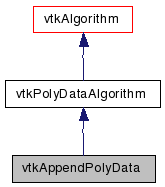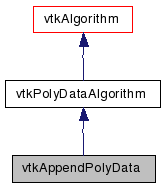vtkAppendPolyData Class Reference
#include <vtkAppendPolyData.h>


Detailed Description
appends one or more polygonal datasets togethervtkAppendPolyData is a filter that appends one of more polygonal datasets into a single polygonal dataset. All geometry is extracted and appended, but point and cell attributes (i.e., scalars, vectors, normals) are extracted and appended only if all datasets have the point and/or cell attributes available. (For example, if one dataset has point scalars but another does not, point scalars will not be appended.)
- See also:
- vtkAppendFilter
- Examples:
- vtkAppendPolyData (Examples)
Definition at line 46 of file vtkAppendPolyData.h.
Member Typedef Documentation
Constructor & Destructor Documentation
| vtkAppendPolyData::vtkAppendPolyData | ( | ) | [protected] |
| vtkAppendPolyData::~vtkAppendPolyData | ( | ) | [protected] |
Member Function Documentation
| static vtkAppendPolyData* vtkAppendPolyData::New | ( | ) | [static] |
Create an object with Debug turned off, modified time initialized to zero, and reference counting on.
Reimplemented from vtkPolyDataAlgorithm.
| virtual const char* vtkAppendPolyData::GetClassName | ( | ) | [virtual] |
Reimplemented from vtkPolyDataAlgorithm.
| static int vtkAppendPolyData::IsTypeOf | ( | const char * | name | ) | [static] |
Return 1 if this class type is the same type of (or a subclass of) the named class. Returns 0 otherwise. This method works in combination with vtkTypeMacro found in vtkSetGet.h.
Reimplemented from vtkPolyDataAlgorithm.
| virtual int vtkAppendPolyData::IsA | ( | const char * | name | ) | [virtual] |
Return 1 if this class is the same type of (or a subclass of) the named class. Returns 0 otherwise. This method works in combination with vtkTypeMacro found in vtkSetGet.h.
Reimplemented from vtkPolyDataAlgorithm.
| static vtkAppendPolyData* vtkAppendPolyData::SafeDownCast | ( | vtkObject * | o | ) | [static] |
Reimplemented from vtkPolyDataAlgorithm.
| void vtkAppendPolyData::PrintSelf | ( | ostream & | os, | |
| vtkIndent | indent | |||
| ) | [virtual] |
Methods invoked by print to print information about the object including superclasses. Typically not called by the user (use Print() instead) but used in the hierarchical print process to combine the output of several classes.
Reimplemented from vtkPolyDataAlgorithm.
| virtual void vtkAppendPolyData::SetUserManagedInputs | ( | int | ) | [virtual] |
UserManagedInputs allows the user to set inputs by number instead of using the AddInput/RemoveInput functions. Calls to SetNumberOfInputs/SetInputByNumber should not be mixed with calls to AddInput/RemoveInput. By default, UserManagedInputs is false.
| virtual int vtkAppendPolyData::GetUserManagedInputs | ( | ) | [virtual] |
UserManagedInputs allows the user to set inputs by number instead of using the AddInput/RemoveInput functions. Calls to SetNumberOfInputs/SetInputByNumber should not be mixed with calls to AddInput/RemoveInput. By default, UserManagedInputs is false.
| virtual void vtkAppendPolyData::UserManagedInputsOn | ( | ) | [virtual] |
UserManagedInputs allows the user to set inputs by number instead of using the AddInput/RemoveInput functions. Calls to SetNumberOfInputs/SetInputByNumber should not be mixed with calls to AddInput/RemoveInput. By default, UserManagedInputs is false.
| virtual void vtkAppendPolyData::UserManagedInputsOff | ( | ) | [virtual] |
UserManagedInputs allows the user to set inputs by number instead of using the AddInput/RemoveInput functions. Calls to SetNumberOfInputs/SetInputByNumber should not be mixed with calls to AddInput/RemoveInput. By default, UserManagedInputs is false.
| void vtkAppendPolyData::AddInput | ( | vtkPolyData * | ) |
Add a dataset to the list of data to append. Should not be used when UserManagedInputs is true, use SetInputByNumber instead.
| void vtkAppendPolyData::RemoveInput | ( | vtkPolyData * | ) |
Remove a dataset from the list of data to append. Should not be used when UserManagedInputs is true, use SetInputByNumber (NULL) instead.
| vtkPolyData* vtkAppendPolyData::GetInput | ( | int | idx | ) |
Get any input of this filter.
Reimplemented from vtkPolyDataAlgorithm.
| vtkPolyData* vtkAppendPolyData::GetInput | ( | ) | [inline] |
Get any input of this filter.
Reimplemented from vtkPolyDataAlgorithm.
Definition at line 76 of file vtkAppendPolyData.h.
| void vtkAppendPolyData::SetNumberOfInputs | ( | int | num | ) |
Directly set(allocate) number of inputs, should only be used when UserManagedInputs is true.
| void vtkAppendPolyData::SetInputByNumber | ( | int | num, | |
| vtkPolyData * | input | |||
| ) |
| virtual void vtkAppendPolyData::SetParallelStreaming | ( | int | ) | [virtual] |
ParallelStreaming is for a particular application. It causes this filter to ask for a different piece from each of its inputs. If all the inputs are the same, then the output of this append filter is the whole dataset pieced back together. Duplicate points are create along the seams. The purpose of this feature is to get data parallelism at a course scale. Each of the inputs can be generated in a different process at the same time.
| virtual int vtkAppendPolyData::GetParallelStreaming | ( | ) | [virtual] |
ParallelStreaming is for a particular application. It causes this filter to ask for a different piece from each of its inputs. If all the inputs are the same, then the output of this append filter is the whole dataset pieced back together. Duplicate points are create along the seams. The purpose of this feature is to get data parallelism at a course scale. Each of the inputs can be generated in a different process at the same time.
| virtual void vtkAppendPolyData::ParallelStreamingOn | ( | ) | [virtual] |
ParallelStreaming is for a particular application. It causes this filter to ask for a different piece from each of its inputs. If all the inputs are the same, then the output of this append filter is the whole dataset pieced back together. Duplicate points are create along the seams. The purpose of this feature is to get data parallelism at a course scale. Each of the inputs can be generated in a different process at the same time.
| virtual void vtkAppendPolyData::ParallelStreamingOff | ( | ) | [virtual] |
ParallelStreaming is for a particular application. It causes this filter to ask for a different piece from each of its inputs. If all the inputs are the same, then the output of this append filter is the whole dataset pieced back together. Duplicate points are create along the seams. The purpose of this feature is to get data parallelism at a course scale. Each of the inputs can be generated in a different process at the same time.
| int vtkAppendPolyData::ExecuteAppend | ( | vtkPolyData * | output, | |
| vtkPolyData * | inputs[], | |||
| int | numInputs | |||
| ) |
| virtual int vtkAppendPolyData::RequestData | ( | vtkInformation * | request, | |
| vtkInformationVector ** | inputVector, | |||
| vtkInformationVector * | outputVector | |||
| ) | [protected, virtual] |
This is called by the superclass. This is the method you should override.
Reimplemented from vtkPolyDataAlgorithm.
| virtual int vtkAppendPolyData::RequestUpdateExtent | ( | vtkInformation * | , | |
| vtkInformationVector ** | , | |||
| vtkInformationVector * | ||||
| ) | [protected, virtual] |
This is called by the superclass. This is the method you should override.
Reimplemented from vtkPolyDataAlgorithm.
| virtual int vtkAppendPolyData::FillInputPortInformation | ( | int | port, | |
| vtkInformation * | info | |||
| ) | [protected, virtual] |
Fill the input port information objects for this algorithm. This is invoked by the first call to GetInputPortInformation for each port so subclasses can specify what they can handle.
Reimplemented from vtkPolyDataAlgorithm.
| void vtkAppendPolyData::AppendData | ( | vtkDataArray * | dest, | |
| vtkDataArray * | src, | |||
| vtkIdType | offset | |||
| ) | [protected] |
| void vtkAppendPolyData::AppendDifferentPoints | ( | vtkDataArray * | dest, | |
| vtkDataArray * | src, | |||
| vtkIdType | offset | |||
| ) | [protected] |
| vtkIdType* vtkAppendPolyData::AppendCells | ( | vtkIdType * | pDest, | |
| vtkCellArray * | src, | |||
| vtkIdType | offset | |||
| ) | [protected] |
Member Data Documentation
int vtkAppendPolyData::ParallelStreaming [protected] |
Definition at line 109 of file vtkAppendPolyData.h.
The documentation for this class was generated from the following file:
- dox/Graphics/vtkAppendPolyData.h
 1.5.6
1.5.6